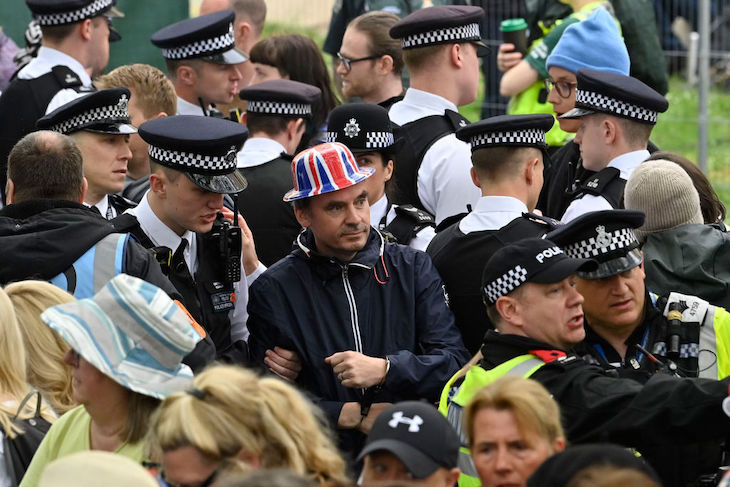The political fallout from the coronation policing row shows us that if Labour does get into government after the next general election, it is going to have a hard time unpicking even reforms it has complained loudly about under the current administration.
Though ministers are having to justify why the Metropolitan Police arrested 64 people, many of whom seem not to have been planning the sort of disruption that the Public Order Bill is supposed to focus on, the bigger difficulty today has been for Labour.
Rishi Sunak did his usual thing of being as detached as possible from events, saying the police were operationally independent from the government and, anyway, he thought they were doing their best to make the coronation the success it had been. The PM said:
‘I’m grateful to the police and everyone who played a part in ensuring that this weekend has gone so well, so successfully, and so safely. That was an extraordinary effort by so many people and I’m grateful to them for all their hard work.’
For their part, the Met have insisted they were clear ahead of the event that the policing was going to be tough, with Commander Karen Findlay explaining:
‘Earlier this week we said our tolerance for any disruption, whether through protest or otherwise, will be low and that we would deal robustly with anyone intent on undermining the celebration.’
The rejoinder to this, of course, is that ‘undermining the celebration’ by wearing a yellow T-shirt and holding a placard isn’t actually disruptive, and should surely be just part of the freedom of speech and protest that a confident democracy enables.
But for Labour, the question has been whether it would repeal the Public Order Act – and the answer has been much more difficult than you might expect.
The party has been rather more troubled by the arrests in London, with its frontbenchers coming under increasing pressure to say whether the party would unpick the Public Order Bill if it makes it into government. Shadow foreign Secretary David Lammy decided to take the ‘we’ll be too busy’ approach, arguing today that ‘we can’t come into office, picking through all the Conservative legislation and repealing it. It would take up so much parliamentary time. We need a positive agenda.’
But his colleague Andrew Gwynne, a shadow public health minister, fretted that the police had been ‘heavy-handed’ and that his party needed to ‘look very carefully at this legislation’. He wouldn’t, though, say that looking carefully would be followed by any more action.
This is the bind Labour finds itself in on a number of recent laws, whether it be on disruptive (or otherwise) protest, illegal migration or trade unions. The party may well oppose these pieces of legislation as they make their way through parliament, but the assumption of the Conservatives is that if Labour does return to government at the next election, ministers will find it very difficult and unpopular to repeal existing legislation, regardless of whether the policies are working.
It’s not the most impressive way of doing public policy, of course: set up any old rubbish law that could have all kinds of bad unintended consequences just so that your opponents are a bit uncomfortable if you lose the next election. Then again, we aren’t in the most impressive era of politics and public policy generally – so that’s not a huge surprise.







Comments